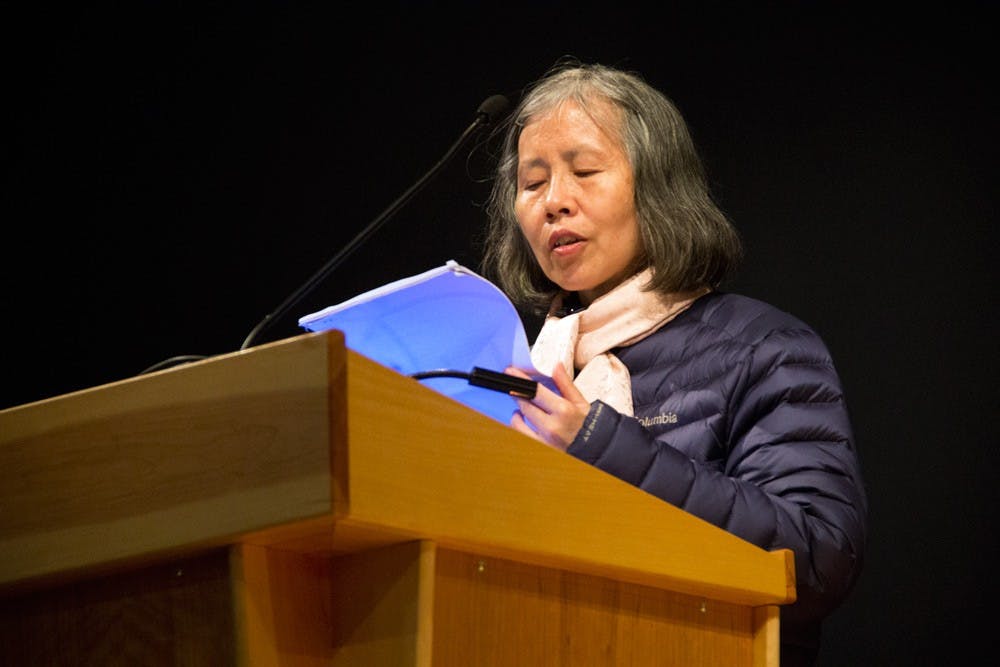Can Xue was born in China in 1953, right on the cusp of the Anti-Rightist Movement. Years later, her intellectual parents and family were persecuted and she was unable to complete her education.
She was alienated and the feeling of isolation is what made Xue the Chinese surrealist writer she is today.
The renowned author visited the UB Center for the Arts on Oct. 10 as part of the Exhibit X Fiction series. The series operates through the English department and aims to challenge the community to “reconsider how stories have been told … and the boundaries that innovative prose resists,” according to the Department of English website.
Xue, along with an English translator, read her work to an audience of about 50 people. She won the 2015 Best Translated Book Award for her novel The Last Lover and explained how her love for writing all started.
She taught herself poetry and literature, particularly Western classics by authors such as Franz Kafka and Jorge Luis Borges. These authors helped Xue find herself as a writer.
“If a person wants to know themselves, the best method is to look in the mirror,” Xue said. “The way I look in the mirror is to read the works of these writers.”
Xue found a kinship with the classic Western authors, though she feels estranged from the current Chinese writing scene.
In the ’80s, there were a few experimental writers Xue kept in contact with. She did her best to garner them attention and get them published, but had little luck.
“They have now stopped writing or changed the way they write,” Xue said. “For a very long time, it has just been me. Now I have no one on the same road as me.”
On what contemporary works she enjoys, Xue said many Chinese writers she admired have stopped writing and that it is too soon to say which American writers she appreciates.
“I’ve read some contemporary, young American writers but I’m not sure they’ll continue,” Xue said. “I will have to wait and see if they are truly first class.”
Xue’s installment consisted of a reading from her Vertical Motion story collection, first in the original Chinese by Xue and then in English by a translator. Q&A sessions were also held before and after the show, moderated by a translator.
After the show, Xue stood alone in the middle of the lobby, apart from signing the occasional book for a fan. She wore her brown corduroy pants, blue parka zipped all the way up and pink scarf around her neck.
Perhaps because of these feelings of loneliness, Xue was genuinely excited to take the stage, thanking the audience for the opportunity to communicate directly with them with a smile on her face.
The audience was receptive of her work, embracing the avant-garde writer.
“I liked the stream of consciousness style,” said Luke Heuskin, a senior English major. “I think it says a lot about how the psyche works. I’d also be interested in hearing a different translation since language plays such a huge role in the interpretation.”
Roughly 50 people sat in the CFA screening room for the event, a respectable turnout but not quite the numbers that Exhibit X reached in previous years.
“In the past we’d get over 100 people,” said Dimitri Anastasopoulos, an associate professor and coordinator of the event. “What we had in there tonight was 10 to 15 members of the community, two writing workshop classes and some graduate students.”
Anastasopoulos said Xue is an important figure in literature and her decision to go on tour in the United States is “rare.”
Xue hopes the future will bring out more surrealist authors and she offered words of advice to aspiring writers.
“Industriously read classical literature,” Xue said. “Live industriously. Love your actual life. Your earthly life. Love people, animals, stones and you.”
David Tunis-Garcia is the assistant arts editor and can be reached at david.garcia@ubspectrum.com. Follow him on Twitter at @davidubspectrum





